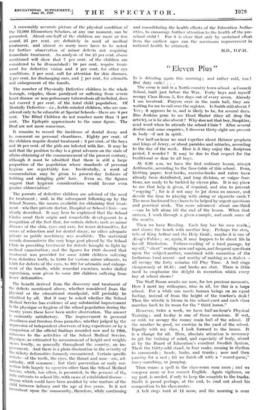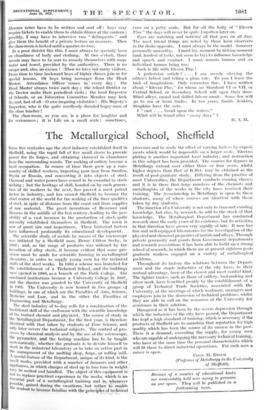"Eleven Plus "
IT is drizzling again this morning ; and rather cold, too But duty calls ! . . .
The scene is laid in a North-country town school—a Council School, built just before the War. Forty boys and myself occupy Class Room 5, five days out of every seven. Already I am involved. Prayers over in the main hall, they are waiting for me to call over the register. Is Smith still absent ? Yes ; it appears he is, and is likely to be, for several days. Has Jenkins gone to see Head Master (they all drop the article), or is he also absent? Why does not that boy, Simpkins, send word when he attends the school Clinic ? After several doubts and some enquiries, I discover thirty-eight are present in body—if not in spirit.
For half-an-hour we read together about Hebrew prophets and kings of Jewry, or about parables and miracles, according to the day of the week. How is it they enjoy the Scripture period, I wonder ? It may be due to that respect for the traditional so dear to all boys.
At 9.30 a.m. we have the first ordinary lesson, always Arithmetic, according to the time-table of this school. Pens, blotting paper, text-books, exercise-books and rulers have already been distributed, and long division, or vulgar frac- tions, are ready to be tackled by eleven plus. It is my place to see that help is given, if required, and also to prevent " copying " ; for is it not easy to jot down an answer, and devote the time to playing with string or cigarette cards ? The more backward boys have to be helped by urgent questions and practical work. The more advanced—about one-third —can be left alone till the end of the lesson. When that arrives, I work through a given example, and mark sonic of the results.
Then we have Reading. Each boy has his own readt.-;„, and shares the bench with another boy. Perhaps the stos.). tells of King Arthur and the Holy Grail ; maybe it is one of ./Esop's Fables ; or, again, it may happen to be about life hi far-off Hindostan. Pattern-reading, of a hard passage, bY myself, " silent" reading now and again, and frequent questions upon the subject-matter, combined with correction of the barbarous local accent—not worthy of ranking as a dialect-7 all occupy the forty minutes till Play Time. A bell ring4 clangorously at 10.45 ; and books arc shut. There is little need to emphasize the delight in recreation which every boy at school shows !
The Staff Room awaits me now, for ten precious moments. Here I meet my colleagues, nine in all, for this is a large school. For a while one meets human beings on an equal footing, instead of from the height of the teacher's desk Then the whistle is blown in the school-yard and each clasS marches back to its room for the " third lesson."
However, twice a week, we have half-an-hour's Physical Training ; and to-day is one of those occasions. If wet., or cold, we occupy the roomy main hall of the school. If the weather be good, we exercise in the yard of the school.' Equally with my class, I look forward to the lesson. It a change for all. Ikre, absolute attention is necessary to get the training of mind, and especially of body, aimed at b7 the Board of Education's excellent Swedish System; Therb the thirty-odd stand, in four ranks, moving in rhythm to commands ; heads, limbs, and trunks ; now and then pausing for a rest ; till we finish off with a " round-game," fancy-marching, or jumping.
Then comes a spell in the class-room once more ; and we compose more or less correct English. Again vigilance, on may part., is needed, if only to keep the essayists to the tracks. Smith is proud perhaps, at the end, to read out aloud his composition to his class-mates.
A bell rings loud at 12 noon, and the morning is over
Absence notes have to be written and sent off ; boys may require tickets to enable them to obtain dinner at the canteen ; possibly, Y may have to interview two " delinquents" and give them the' benefit Of .a primate lecture on manners. Then the class400rn is loCked until a quarter-to-two.
In a poor district like this, I must always be specially keen on cleanliness of body and clothing. At two o'clock, three rascals may have to be sent to remedy themselves with soap, water and towel, provided ,by. the authorities. There is no escape and, also, no excuse l cThen ivelnive'imii-many visitors, From time to time backward toys-of- highei Cla.4ses join us for special. lessons. Or boys bring 'meesfigeg -fro m the Head Master. Attendance °Meer ' domes in.- every day ; the Head Master always tw iee7eaeh -day -;- the Dentist or the Doctor make theite-pesiodical-visit; the local Inspector of Schools, or an Education Crinimittee Member may look in; and, last of all-0 awe-inspiring visitation !—His Majesty's Inspector, who is the quite needlessly dreaded bogey-plan of
the class teacher ! * The class-room, as you see, is a place for laughter and for seriousness ; it is Life on a small scale ; sometimes, even on a petty - scale. But for all the forty of " EleVen Plus " the days will never be quite forgotten later on.
- Eyes are watching and noticing-all that goes on all day. The most trivial things arc noted by those keen observers in the desks opposite. I must always be the model—however personally unworthy. I must try, moment by-ticking moment (and, hardest of tasks, not seem to try) to influence knowledge and speech and conduct. I must remain human and an individual human being too.
'Such is life with Eleven Plus !
A pedestrian article ? . . . I am merely obeying the editor's behest and telling a plain tale. To you I leave the task of imagination. Only remember this. I have written about " Eleven Plus," for whom no Standard VI or VII, or • Central School, or Secondary School will open- their door. Blind alleys, casual and skilled labour await. Sonic few will go to sea or learn trades. In ten years, Smith, JefikinS, Simpkins have the vote.: I " cast . . bread upon the waters."
What will be found after " many days " ? R.A.



























































 Previous page
Previous page